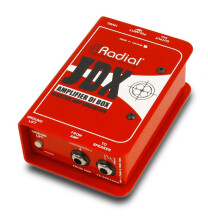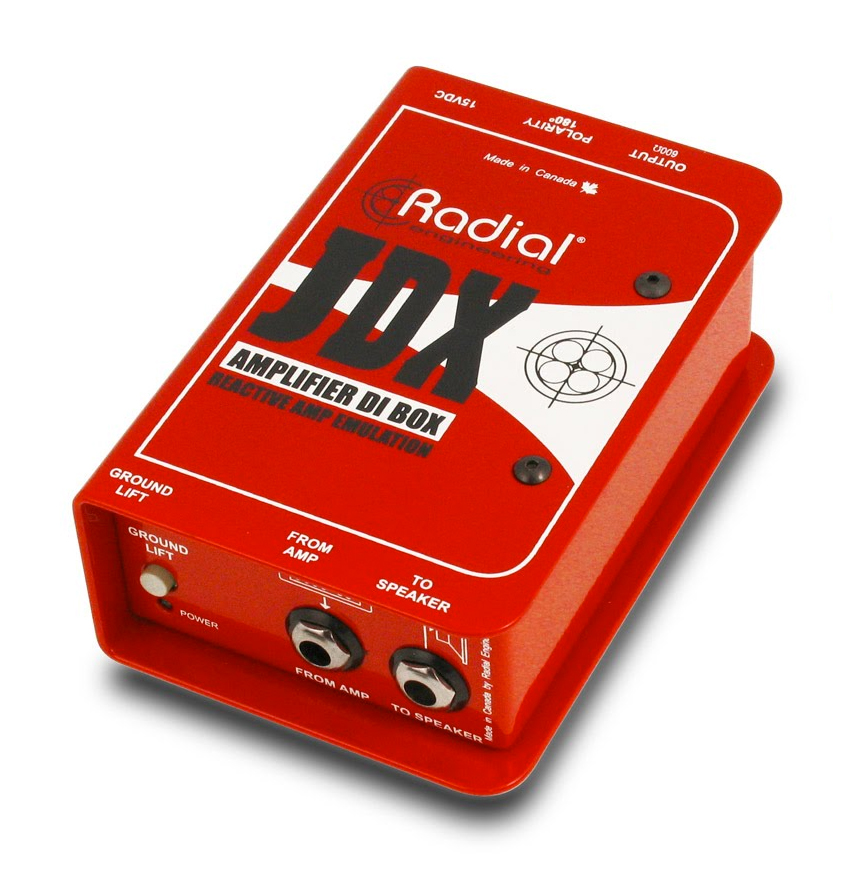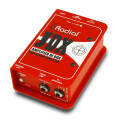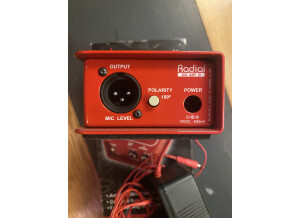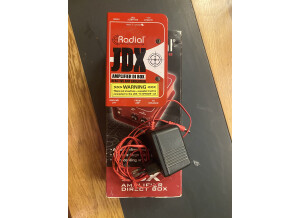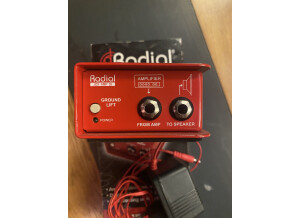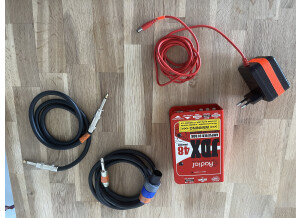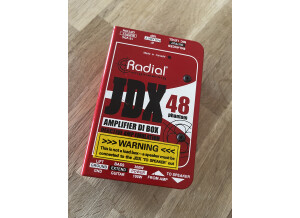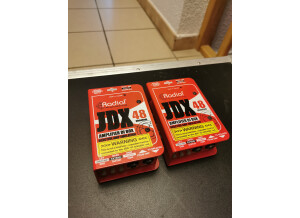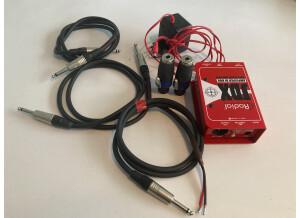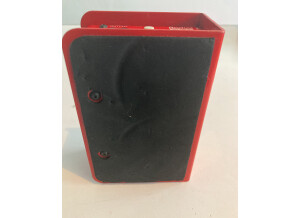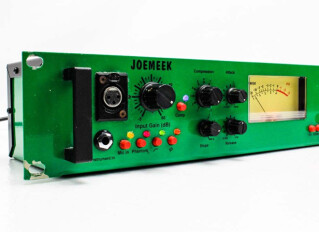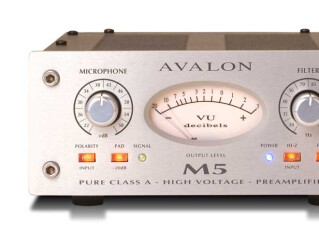JDX classified ad
Alerte nouvelle annonceNews
Images
Reviews
4.7/5(3 reviews)
67 %
33 %
Write a user review
Published on 05/26/09 at 09:57
This DI box is in a league of its own. The defining characteristic of this box is its simulation of an amplifier cabinet. The only effect that is created is replicating the sound of an amp.
UTILIZATION
The setup isn't too different from a regular DI. The main difference is that rather than going from the electric guitar/bass to the amplifier, this box is supposed to come between the amp head's output and the speaker cabinet. Therefore, it helps mimic the sound of the cabinet, virtually and ideally negating the need for a microphone. The setup is really straightforward and easy, and the manual, if even necessary at all, is clear and succinct.
SOUND QUALITY
I have to say that this is...…
UTILIZATION
The setup isn't too different from a regular DI. The main difference is that rather than going from the electric guitar/bass to the amplifier, this box is supposed to come between the amp head's output and the speaker cabinet. Therefore, it helps mimic the sound of the cabinet, virtually and ideally negating the need for a microphone. The setup is really straightforward and easy, and the manual, if even necessary at all, is clear and succinct.
SOUND QUALITY
I have to say that this is...…
Read more
This DI box is in a league of its own. The defining characteristic of this box is its simulation of an amplifier cabinet. The only effect that is created is replicating the sound of an amp.
UTILIZATION
The setup isn't too different from a regular DI. The main difference is that rather than going from the electric guitar/bass to the amplifier, this box is supposed to come between the amp head's output and the speaker cabinet. Therefore, it helps mimic the sound of the cabinet, virtually and ideally negating the need for a microphone. The setup is really straightforward and easy, and the manual, if even necessary at all, is clear and succinct.
SOUND QUALITY
I have to say that this is far removed from most DI boxes I've encountered, but in reality far more useful. I prefer the sound of an amplifier to a DI box (for both guitar and bass, but especially guitar). The only problem that can sometimes occur is that I won't have access to the kind of microphone I need or the room I'm recording in won't allow for a clear, powerful sound. This can be solved easily by the JDX. The sound that comes out of the DI itself is certainly better than most DIs. It does a pretty amazing job of emulating the speaker cabinet that you are using. That being said, however, it's nothing compared to the combined effect of running a microphone from the speaker as well as having the DI signal. Mixing both in Pro Tools allows the engineer far greater control in terms of color and timbre. Even if the microphone signal is dominant in the mix (as it usually is with me), the power and texture added by the JDX is invaluable. I usually don't use another DI unless the player demands a really dry, clean tone (which is something I usually don't encourage, but have to do anyway).
OVERALL OPINION
I've only recently purchased this item and it's become my choice DI for recording rock bass. Occasionally I'll use it on a thick electric guitar as well. I like the fact that it's not dry and weak like average DIs. I haven't tried anything that really compares to this. I think that it's definitely a little pricey but it's worth it if you like what you hear. I certainly did. I highly recommend it to people who record rock and have limited mic selection!
UTILIZATION
The setup isn't too different from a regular DI. The main difference is that rather than going from the electric guitar/bass to the amplifier, this box is supposed to come between the amp head's output and the speaker cabinet. Therefore, it helps mimic the sound of the cabinet, virtually and ideally negating the need for a microphone. The setup is really straightforward and easy, and the manual, if even necessary at all, is clear and succinct.
SOUND QUALITY
I have to say that this is far removed from most DI boxes I've encountered, but in reality far more useful. I prefer the sound of an amplifier to a DI box (for both guitar and bass, but especially guitar). The only problem that can sometimes occur is that I won't have access to the kind of microphone I need or the room I'm recording in won't allow for a clear, powerful sound. This can be solved easily by the JDX. The sound that comes out of the DI itself is certainly better than most DIs. It does a pretty amazing job of emulating the speaker cabinet that you are using. That being said, however, it's nothing compared to the combined effect of running a microphone from the speaker as well as having the DI signal. Mixing both in Pro Tools allows the engineer far greater control in terms of color and timbre. Even if the microphone signal is dominant in the mix (as it usually is with me), the power and texture added by the JDX is invaluable. I usually don't use another DI unless the player demands a really dry, clean tone (which is something I usually don't encourage, but have to do anyway).
OVERALL OPINION
I've only recently purchased this item and it's become my choice DI for recording rock bass. Occasionally I'll use it on a thick electric guitar as well. I like the fact that it's not dry and weak like average DIs. I haven't tried anything that really compares to this. I think that it's definitely a little pricey but it's worth it if you like what you hear. I certainly did. I highly recommend it to people who record rock and have limited mic selection!
See less
40
»
Published on 11/03/08 at 09:42
(Originally written by pol-personne/translated from Audiofanzine FR)
Read the excellent description on the product's website.
UTILIZATION
Extremely easy to use, just unplug the speaker cable coming from the amp head and insert the JDX
and then connect the XLR output to the desk.
This product can replace the line outputs from amps and even the outputs with speaker simulation.
The user's manual is clear.
SOUND QUALITY
The sound is good.
Compared to it the standard amp outputs sound extremely nasal. The JDX doesn't reproduce the amp sound recorded with a mic, but I was very pleased as soon as I heard it and it's even better with a good EQ on the desk.
When I decrease the amp volume and...…
Read the excellent description on the product's website.
UTILIZATION
Extremely easy to use, just unplug the speaker cable coming from the amp head and insert the JDX
and then connect the XLR output to the desk.
This product can replace the line outputs from amps and even the outputs with speaker simulation.
The user's manual is clear.
SOUND QUALITY
The sound is good.
Compared to it the standard amp outputs sound extremely nasal. The JDX doesn't reproduce the amp sound recorded with a mic, but I was very pleased as soon as I heard it and it's even better with a good EQ on the desk.
When I decrease the amp volume and...…
Read more
(Originally written by pol-personne/translated from Audiofanzine FR)
Read the excellent description on the product's website.
UTILIZATION
Extremely easy to use, just unplug the speaker cable coming from the amp head and insert the JDX
and then connect the XLR output to the desk.
This product can replace the line outputs from amps and even the outputs with speaker simulation.
The user's manual is clear.
SOUND QUALITY
The sound is good.
Compared to it the standard amp outputs sound extremely nasal. The JDX doesn't reproduce the amp sound recorded with a mic, but I was very pleased as soon as I heard it and it's even better with a good EQ on the desk.
When I decrease the amp volume and increase the gain in the desk it sounds like a very good solid-state amp. When I increase the amp's volume because I'm playing on a small outdoor stage the sound is still nice and powerful.
OVERALL OPINION
The easy setup and the sound quality convinced me and I don't use a mic anymore on small stages.
I know it's a little bit expensive
but I recommend it if you are regularly on tour like me.
Read the excellent description on the product's website.
UTILIZATION
Extremely easy to use, just unplug the speaker cable coming from the amp head and insert the JDX
and then connect the XLR output to the desk.
This product can replace the line outputs from amps and even the outputs with speaker simulation.
The user's manual is clear.
SOUND QUALITY
The sound is good.
Compared to it the standard amp outputs sound extremely nasal. The JDX doesn't reproduce the amp sound recorded with a mic, but I was very pleased as soon as I heard it and it's even better with a good EQ on the desk.
When I decrease the amp volume and increase the gain in the desk it sounds like a very good solid-state amp. When I increase the amp's volume because I'm playing on a small outdoor stage the sound is still nice and powerful.
OVERALL OPINION
The easy setup and the sound quality convinced me and I don't use a mic anymore on small stages.
I know it's a little bit expensive
but I recommend it if you are regularly on tour like me.
See less
00
»
Travel companion
Published on 05/23/11 at 08:56 (This content has been automatically translated from French)For all technical information,
It is best to go see the site builder.
UTILIZATION
The setup is very simple
Plugs 2 6.35 (1 from the head and the other from the baffle)
1 XLR for mic at the table
I never opened the manual, and I think even he lost!
When I play on a small stage:
- I only use the radial, which allows me to save space
and when I play on more substantial scenes (festival. .. or there is no problem of space on stage)
- I torque to a micro what is available (SM57, or other ...)
Radial panning to one side and the other microphone,
the sound is still there!!
SOUND QUALITY
This is perfect for my use
this replaces a microphone in front of the baffle...…
It is best to go see the site builder.
UTILIZATION
The setup is very simple
Plugs 2 6.35 (1 from the head and the other from the baffle)
1 XLR for mic at the table
I never opened the manual, and I think even he lost!
When I play on a small stage:
- I only use the radial, which allows me to save space
and when I play on more substantial scenes (festival. .. or there is no problem of space on stage)
- I torque to a micro what is available (SM57, or other ...)
Radial panning to one side and the other microphone,
the sound is still there!!
SOUND QUALITY
This is perfect for my use
this replaces a microphone in front of the baffle...…
Read more
For all technical information,
It is best to go see the site builder.
UTILIZATION
The setup is very simple
Plugs 2 6.35 (1 from the head and the other from the baffle)
1 XLR for mic at the table
I never opened the manual, and I think even he lost!
When I play on a small stage:
- I only use the radial, which allows me to save space
and when I play on more substantial scenes (festival. .. or there is no problem of space on stage)
- I torque to a micro what is available (SM57, or other ...)
Radial panning to one side and the other microphone,
the sound is still there!!
SOUND QUALITY
This is perfect for my use
this replaces a microphone in front of the baffle most of the time,
Staining close to the SM57 is saying ... to check because I'm not a black belt in SM57!
I used it for about 20 dates, and if the sound engineer was not afraid, it can give a very good result, and above all it saves time for installation.
OVERALL OPINION
After my guitar is the thing I always with me.
I'm pretty plug and play as a person,
I travel with just my guitar, 2 / 3 pedals, and radial ... all in a bag (laptop type)
So I fly easily (without much luggage supplements good for the wallet ...)
as being on the come, I would have no control head with my mic back.
And especially I can settle in less than 10mn, so I can hang out at the bar longer, and I do appreciate the sound engineer, so it's better for everyone!
This is a purchase that I would do if it breaks, thats it has survived, with beer, kicking ... and nothing has changed, it is always easy to use!
If it survives Kerry King, it will outlive me!
It is best to go see the site builder.
UTILIZATION
The setup is very simple
Plugs 2 6.35 (1 from the head and the other from the baffle)
1 XLR for mic at the table
I never opened the manual, and I think even he lost!
When I play on a small stage:
- I only use the radial, which allows me to save space
and when I play on more substantial scenes (festival. .. or there is no problem of space on stage)
- I torque to a micro what is available (SM57, or other ...)
Radial panning to one side and the other microphone,
the sound is still there!!
SOUND QUALITY
This is perfect for my use
this replaces a microphone in front of the baffle most of the time,
Staining close to the SM57 is saying ... to check because I'm not a black belt in SM57!
I used it for about 20 dates, and if the sound engineer was not afraid, it can give a very good result, and above all it saves time for installation.
OVERALL OPINION
After my guitar is the thing I always with me.
I'm pretty plug and play as a person,
I travel with just my guitar, 2 / 3 pedals, and radial ... all in a bag (laptop type)
So I fly easily (without much luggage supplements good for the wallet ...)
as being on the come, I would have no control head with my mic back.
And especially I can settle in less than 10mn, so I can hang out at the bar longer, and I do appreciate the sound engineer, so it's better for everyone!
This is a purchase that I would do if it breaks, thats it has survived, with beer, kicking ... and nothing has changed, it is always easy to use!
If it survives Kerry King, it will outlive me!
See less
70
»
Tech. sheet
- Manufacturer: Radial Engineering
- Model: JDX
- Category: DIs
- Added in our database on: 11/03/2008
We have no technical specifications for this product
but your help will be much welcomed
»


